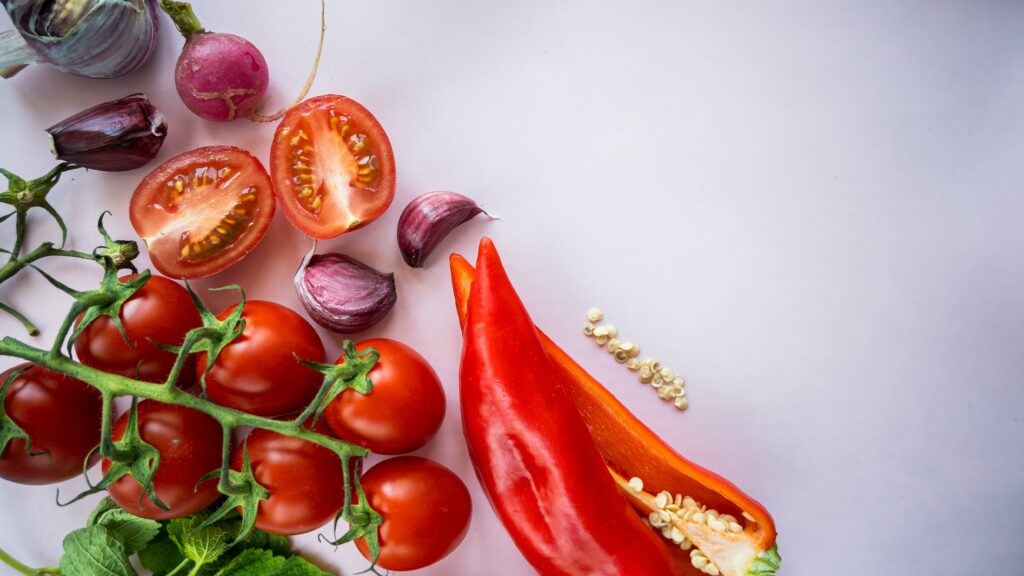Two Week Coaching plan- Add vegetables and go green.
For the next two weeks we are going to work on going green and how to add veggies to every meal, a new habit to change your life.
This two week coaching plan is a guided support in a daily format to help start creating habits for health. The biggest key to your success is consistency and it is the daily habit routine that helps you get there. These daily reminders are me on your shoulder empowering and coaching you to positive change

For the next two weeks, I challenge you to eat fresh vegetables with every meal. Veggies boost our health and vitality while promoting growth, reproduction, energy as well as the vitamins and minerals the body needs.
The more handfuls of spinach, sides of carrots or pieces of fruit you eat daily, the more effectively you are improving your body.
By simply eating fresh fruit and vegetables, you get heaps of calcium for your bones, iron for your blood and vitamin C for your immune system.
You do this by adding nutrient-dense leafy greens, seasonal vegetables, fruit, and berries to your plate at every meal.
It will make you feel sharper, stronger, and more capable than ever.
The first steps to creating new habits is consistency, aim to start the first week by hitting 5 days out of 7, even consider the Power of 3 habits where you have listed eating fruit and veggies as a daily habit and tick each day off as you do so.
Remember hit that fruit and or veggie with every meal, even breakfast. Whose to say you cannot have a handful of spinach in your scrambled eggs for breakfast or choose different fruits in your overnight oats, be adventurous.
Today, after completing your habit for the first time, I want you to answer these two questions:
- What did I do well today?
- What did I learn today?
These questions are so important as you reflect on your day.
The truth is the most overlooked factor in building new habits is bridging the gap between what you want to do and the behaviour that you’re trying.
Veggies are the food of life.
Vitamins and minerals (also known as micronutrients) are vital for life.
Most vitamins and minerals are essential, as the body cannot synthesise them so they must be obtained from the diet. These nutrients carry out important functions such as growth, repair, protection, reproduction as well as protecting the immune system.
Although we get these nutrients from most of the foods we eat, some foods have more vitamins and minerals than others.
Micronutrients are all-natural compounds found in food
Deficiency can occur when micronutrient consumption is reduced or limited
Scientists have investigated the possibility that large doses of certain vitamins and minerals will help stave off chronic diseases such as cancer and heart disease.
When people say they have not had the time to focus on the habit change, what they really mean is either:
- They do not have the motivation
- They have not made it a priority
One of the best ways of dealing with this is to make the habit as small as possible, so it is hard to say ‘no’ to the habit.
Cut the habit down to time such as one or two minutes, and there you cannot say you do not have the time.
Note that this solution helps overcome several habit obstacles: not having enough time, not enough energy, being overwhelmed or afraid of change – which is why small changes are so incredibly important for overcoming obstacles.
Remember forming new habits and breaking old ones is a skill which we need to practice every day, the key is giving it your all as you focus hard to achieve.

Did you know that by adding colour to your diet especially in the form of your veggie choice you are adding diversity to the nutrients that you are feeding your gut. This nutritional return plays a vital role in supporting a health immune system that is the bedrock of our health.
It can be difficult to stay consistent with a habit if you have a lot going on in your life, or if you take a break from your normal routine.
The perfect example of this is the weekend.
So, set yourself up to win this weekend.
Today, I want you to plan how you will eat fresh vegetables with every meal this weekend and continue the process of forming this new habit.
You now know that micronutrients in our veggies are essential components of our diet. The body cannot make any of the micronutrients (except vitamin D, from sunlight) so we need to intake an adequate amount from food.
You may ask, “Should I supplement with a multivitamin?”
There is not a lot of research to show that increasing daily dosages of micronutrients above the Recommend Daily Allowance levels significantly improves health or athletic ability.
So, supplementation is not essential.
But there is evidence to suggest that supplemental vitamin C and E, acting as strong antioxidants, may enhance recovery after exercise by reducing oxidative stress.
And those with low iron levels, particularly menstruating females, could benefit from an iron supplement.
By eating a well-balanced and complete diet, you should receive all the micronutrients in sufficient amounts, but this is not always the case.
If you do find your diet lacking in fruit and vegetables, you may suffer from deficiencies.
In these cases, supplementation can ensure no deficiencies are present.
Keep up the great work and enjoy your weekend

When you are done doing the habit today, take a minute to reflect on the past week or so of doing the habit.
What has it been like, as opposed to the fantasy you had about it before you started?
What have you learned?
What do you appreciate?
What obstacles have come up, and are there ways to overcome them for next week?
Consider writing a short journal entry about these reflections, to solidify your learning.
Treat habit formation as a learning process, to learn about yourself, your mind, mindfulness, resistance and more.
If all went well last week, and you did not struggle or skip the habit for more than a day, I recommend that you lengthen the habit this week.
If you have struggled, keep it the same as last week or make it even easier.
For example, if you have just been eating a very small number of vegetables with each meal, then try increasing the amount this week.
If you have struggled with eating vegetables at a certain meal, put extra focus this week on getting it right.
Never make too big an adjustment so that it becomes too difficult, this slow change process of expanding the habit a little at a time helps overcome the resistance of the mind to change and discomfort.
Gradually the habit becomes your new normal and you can expand a bit more, pushing your comfort zone a little at a time.
Veggies also contain Phytonutrients.
The phytonutrients are a class of substances found in plant foods.
These nutrients appear to help promote health and reduce risk of cancer, heart disease and other conditions.
Phytonutrients are responsible for providing plants their colours (the red of tomatoes, for example) and distinctive aromas (such as garlic).
You can benefit from eating the phytochemicals in fruits, vegetables, legumes, whole grains, herbs, and seeds.
As they provide energy or building blocks to the body, they are not classified as essential nutrients, but they still play a key role by serving as powerful antioxidants that can help reduce blood pressure and cholesterol, prevent cataracts, minimise menopause symptoms and reduce osteoporosis.
A well-balanced diet based on whole foods, with ample amounts of fruit, vegetables, legumes, whole grains, herbs and seeds should provide the body with plenty of phytochemicals.
New habits allow us to grow, succeed and reach positive outcomes as we enjoy the journey to improved health. Creating new habits allows us ditch old ones in the process but this does require effort and time and is not always easy to do.
Have a good intention for the habit, know where the new habit is leading you, how great you will feel when these habits are so natural you do not even think about it.
Be creative in your thinking and ask yourself what habit would you love to do next.
Go for it start snacking on those veggies too.
The truth is the path to changing your habits and the gradual changing of your body and health won’t be straight, ordered and neat. It will be messy, littered with failed habits, with constant stops and restarts.
But if you can accept this and prepare for this, then the process can be a lot easier.
So set yourself up to win this weekend and achieve your habit with ease. Today, think about your super easy, almost effortless version of the habit for the weekend.
How and when will you do the habit this weekend?
We are almost at the end of the ‘Eat vegetables with every meal’ habit challenge.
As you prepare to move onto the next habit challenge, you will want to put this current habit into ‘habit maintenance mode.’
This is a way of continuing it with less of a focus.
Your habit should start to become more automatic if you have been a little consistent.
You do not need to keep track of it every day, as long as things are going well. But every few days, pause and reflect on this habit and check in to see that everything is still going well.
Maybe once a week, use one of our Sunday reflection sessions to assess whether you have any obstacles around this habit, need to adjust, learned anything new.
Stay focused this weekend and remember enjoy the process.
Enjoy your weekend and remember meals such as soups, curries, chilli, salads and more can be ramped up with great vegetable content.

Over the last two weeks you have completed the ‘Eat fresh vegetables with every meal’ habit challenge – nice work!
Today, take a minute after practicing your habit to reflect again on the past week of doing the habit.
What has the habit been like and how have you done?
What have you learned?
What parts or how much of this habit will you continue to do?
Treat habit formation as a learning process, as you continue your journey to a new healthier and happier you.
